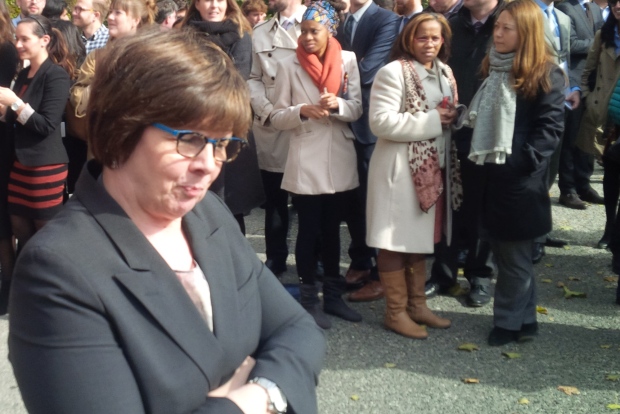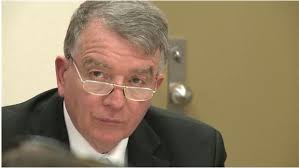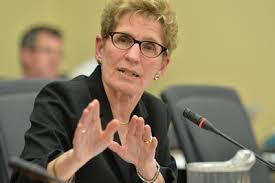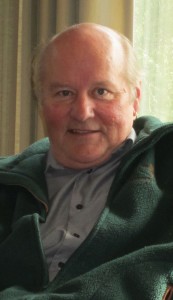 By Ray Rivers
By Ray Rivers
September 20, 2017
BURLINGTON, ON
Were they set up or just naive? To be a candidate for the Ontario Liberal Party one has to be approved by the Leader of the Party. So how did this by-election in Sudbury become such a mess?
Liberal candidate Andrew Olivier had narrowly missed winning a Sudbury seat in the 2014 provincial general election. So when the seat became vacant a year later, he naturally assumed he’d be the automatic choice for the party. But the Premier had promised the nomination to someone else, a better candidate in her mind, Glenn Thibeault, the federal NDP member for the riding who was willing to leave the federal arena and change parties, presumably for a good reason.

Ontario Energy Minister Glenn Thibeault with Burlington Hydro president Gerry Smallegange looking over the map showing where the outages were during the 2015 snow storm.
Thibeault won the election handily, slipping past the NDP provincial candidate and trouncing Olivier, who had no choice but to run as an independent. Thibeault must have met the Premier’s expectations because she later moved him into her Cabinet as energy minister, giving him the hot energy file and the job of developing the province’s long term energy plan.
No doubt Olivier was sore about not having got the nod to run a second time under the red banner, but under provisions of the Liberal Party’s constitution the leader is pretty much allowed to appoint any candidate she chooses, especially in a by-election. And then, as we know, hell hath no fury like a spurned political candidate. So somebody in the Party needed to talk him down in case he walked right out of the Liberal camp with all his supporters. And that is when it all got messy.

Pat Sorbara, major force in the Premier’s office has to resign and defend herself in a Sudbury court room
And when the Premier’s chief of staff, Pat Sorbara, and a local Liberal organizer, Gerry Lougheed, spoke with Olivier, he recorded their conversations. He claims they had offered him a job or appointment. But instead of being placated by their apparent concern for his economic future, he took his recordings to the nearest cop shop.
Apparently Olivier knew something they hadn’t considered. There is a 1998 provision of the Ontario Elections Act….”96.1 No person shall, directly or indirectly, (e) give, procure or promise or agree to procure an office or employment to induce a person to become a candidate, refrain from becoming a candidate or withdraw his or her candidacy. 1998, c. 9, s. 44.”
Provincial MPPs may be elected locally and they are expected to serve their local electorate. But a Cabinet minister governs for the entire province and not just his/her constituency. And that can be a good reason for a party leader to have the authority to appoint a candidate.
Nomination meetings can become popularity contests where family and friends, and in some cases a whole community arrive in droves. And this wave of ‘instant’ party members can propel the favourite son or daughter on to victory as the chosen nominee. ‘Instant’ because they weren’t party members before this event, nor likely will be again.
None of this should imply that the most popular candidate is not the best or the best qualified. But just in case, the party always vets, the Leader has the final say and sometimes she/he appoints rather than allow a nomination meeting. The Premier wanted Thibeault for her Cabinet – her choice, her call. Anyone who meets the basic qualifications can run for provincial office, but those running under a party’s banner need to be blessed by the leader.

Liberal party organizer in Sudbury – Gerry Lougheed
Sorbara and Lougheed have been criminally charged and the case is now before a judge. There will be a determination as to whether what the party did amounted to bribery or whether the accused were just offering Olivier a gesture, a consolation prize after the fact. Even if the judge dismisses the charges, this will be an important lesson and precedent for the future.
Apparently Olivier wasn’t offered public service employment – which requires merit testing – or even a specific job or appointment at all. But the point is that Sorbara and Lougheed didn’t even need to talk with him, and you can bet they wish they hadn’t. The upshot, no matter how the judge rules, is that the Premier and her party will take a hit for something that could have and should have been avoided.

Telephone calls that didn’t ave t be made were made – might cost Premier Wynne the June 2018 election. The one thing that might keep her in office is the quality of the other choices.
Olivier stands to gain little if anything out of this case except the personal satisfaction of knowing that he has cost the accused their jobs and knowing that he may have hurt the Premier as she approaches another election next year. The notoriety of the case may help or hurt him with his political ambitions. And who knows, one day he may get to sit in the Pink Palace? But it won’t be as a Liberal.
 Ray Rivers writes weekly on both federal and provincial politics, applying his more than 25 years as a federal bureaucrat to his thinking. Rivers was a candidate for provincial office in Burlington in 1995. He was the founder of the Burlington citizen committee on sustainability at a time when climate warming was a hotly debated subject. Tweet @rayzrivers
Ray Rivers writes weekly on both federal and provincial politics, applying his more than 25 years as a federal bureaucrat to his thinking. Rivers was a candidate for provincial office in Burlington in 1995. He was the founder of the Burlington citizen committee on sustainability at a time when climate warming was a hotly debated subject. Tweet @rayzrivers
Background links:
Ontario Elections Act – Ontario Liberal Constitution – Sudbury Riding –
Legality of Recording Evidence – Timeline




















The kind of nonsense that went on in Sudbury was sleazy and showed contempt for the democratic process. Given Thibeault’s less than stellar performance as Energy Minister, and the ensuing scandal and court case, I’m sure Wynne is having many second thoughts about elevating him to Cabinet.
What’s more disturbing is that given the provincial Liberals unpopularity, and the number of MPPs retiring or not seeking re-election, you would think there would be more open calls from amongst the rank and file for her to step down. The lack of rebellion, anger and disgust amongst Liberal supporters given Wynne’s pathetic track record is what I find truly regrettable.
Who gives a crap. Wynne is toast in the next election. Problem solved.